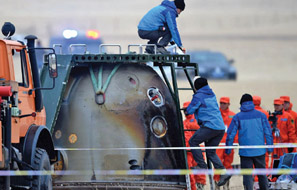Tourism improves lives in north China deserts
HOHHOT -- Zhu Guangzhong had a great National Day holiday this year, and he didn't even have to leave his hometown. Bayan Hot, where Zhu lives, played host to a desert car race, which drew more than 900,000 visitors.
"I opened my house as a home stay a month before the national holiday. I charge 100 yuan ($15) for each bed," Zhu said. "I made about 10,000 yuan during the holiday."
It is hard to imagine that only a decade ago. The remote town in Alxa League, north China's Inner Mongolia Autonomous Region, was little more than a dust trap, plagued by dry and sandy winds, with sparse land due to over-grazing, far from what it looks like today.
About 93 percent of Alxa League is sand or rocks, and the Badan Jaran, Tengger and Ulan Buh deserts account for a third of its total area. Many of its residents, who lived below the poor line, had turned to excessive grazing to make a living, which made the environment even more hostile.
China has one of the worst records for desertification in the world, with more than 1.5 million square kilometers of sandy areas, accounting for about 15.9 percent of the country's land, according to a report issued Tuesday report by Tencent.
In June, Vice Premier Wang Yang spoke about the effective measures taken by China to contain the spread of desertification, adding that the nation would continue to preserve the environment and strive to build a beautiful China.
In Alxa League, the local government had turned to developing tourism in the desert to not only improve the environment but also to benefit residents.
TOURISM HOT IN DESERTS
In Alxa, an increasing number of herdsmen have shifted to the tertiary industry, with many employed at local tourist destinations or by tour companies. The increased number of visitors in recent years has improved local accommodation and catering businesses.
During this year's National Day holiday, room prices at some hotels rose by as much as eight times. Tourists came to experience the "Grotesque Stone Festival," the "Populus Euphratica Tree Festival," a bicycle tournament and a desert race.
Ma Juan, manager of a local hotel, said that rooms of her hotel had been reserved days before the holiday.
"Room prices rose significantly thanks to these activities," Ma said. "Our cheapest room rose to 780 yuan from a little over 100 yuan."
About 1.8 million domestic and foreign tourists visited Alxa League during the holiday, generating tourism revenue of 1.36 billion yuan.
Herdsmen also benefited from the tourism boom.
"Even in the deserts, I can still make money," said Erdengdalai, who lives deep in Badan Jaran Desert. A few years ago, the local government limited grazing in the area to restore environment, which saw his income decrease. But after a series of tourism festivals and desert racing competitions were launched, he found a new way to make money.
"The government helped me buy an SUV and encouraged me to take tourists for a ride through the desert," he said. "With the SUV business, I can make about 80,000 yuan each year."
The local government said it plans to further boost the tourism industry in Alxa League, and will try to make it an "international tourism spot" in the next five years, according to a government meeting held earlier this year.
BETTER ENVIRONMENT
While developing the industry, local authorities are also paying attention to environmental restoration.
In the league's Ejin Banner, for instance, hundreds of thousands of Chenopodiaceae plants have been growing over an area of 3,500 mu (233 hectares).
Ejin Banner was once the worst source of sand storms, but after the local government encouraged farmers to return land and limit grazing, the eco-system has been recovering. The plantation of populus euphratica trees in Ejin Banner has reached 444,000 mu so far, attracting 87,000 visitors during the National Day holiday.
"In the past, life was bitter because generations in my family depended on excessive grazing to make a living," said Erdengdalai. "But now with tourism on the desert, our lives are so much better."
- Study shows Zika virus more resilient than previously known
- Report reveals Beijing to be the largest producer of domestic waste
- Chinese archeologists find clues about appearance of early birds, dinosaurs
- Man detained for using child labor in eastern China
- Hong Kong police hunting robbers of 20 mln worth of gold bars

























